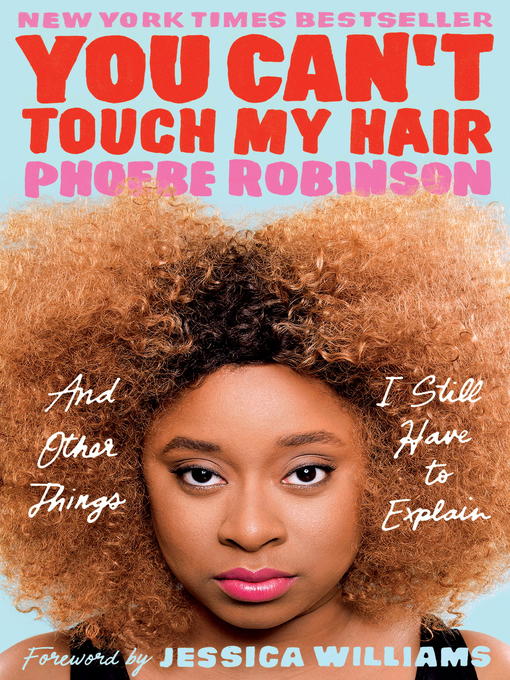
You Can't Touch My Hair
And Other Things I Still Have to Explain
کتاب های مرتبط
- اطلاعات
- نقد و بررسی
- دیدگاه کاربران
نقد و بررسی

July 25, 2016
Robinson, a stand-up comedian and host of the WNYC podcast 2 Dope Queens, brings a funny and original voice to her debut book of essays, combining personal experience with social commentary on race, gender, and pop culture. Moving, poignant, witty, and funny, Robinson takes on America’s “tumultuous” relationship with African-American hair, providing a history of black hair on the stage and screen as well as her own relationship with her hair (she didn’t go natural until after she finished high school). In other essays, she rants about the way the NFL treats women, discusses the demands she’d make on the first female U.S. president, and explains how to avoid being the token black friend. Robinson reveals how she uses her humor to survive the indignities that go along with being black in America, such as being followed around while shopping in stores or being called “uppity” for expressing her wishes to a white director. This is a promising debut by a talented, genuinely funny writer.

A black female comedian lays it all out there.Stand-up comic and co-star of the WNYC podcast 2 Dope Girls, Robinson has a lot to complain about, starting with the need people have to touch her hair. In case readers fail to pick up on her humorous vibes regarding hair, the author includes a second chapter on the history of black hair in film, TV, and other media. Throughout the book--a hybrid of humor, truth-telling, and poking-fun-at-life-in-general--Robinson delves into what it means to be a woman and black and, more importantly, a black woman in today's American society. Filled with references to pop culture and plenty of hashtags, the narrative addresses issues like how to avoid being the one black friend in a group of white people, the difficulty of being hired to play a role in a show because you're either too black or too light, and why NFL players need to treat women better. She gives readers her list of nine guilty pleasures (No. 1: "Ranking Members of U2 in the Order of Whom I Want to Sleep With"; The Edge is first) and a list of demands for a future female president, including penalizing those who perpetuate the thigh-gap obsession. She also explains why "Lisa Bonet is Bae. Queen. Jesus" and waxes poetic on why she takes her laundry home to her parents' house. "If a person were to play [the dryer] in a movie--don't ask me why--it would be played by Meryl Streep," she writes. "The dryer is that damn good." Although the humor is forced and tiresome in places, Robinson does hit the mark on some important issues, and fans of her podcast will enjoy the book. Up-and-down humor that sometimes gets to the heart of the realities of being black in America. COPYRIGHT(1) Kirkus Reviews, ALL RIGHTS RESERVED.

September 15, 2016
Blending memoir and social commentary, this debut book by comedian, writer, and actress Robinson (cohost of the podcast 2 Dope Queens) reflects on pop culture and modern black womanhood. From the hot combs of her childhood to the transition to natural hair after high school, Robinson candidly shares her hair journey and reminds black women that our hair determines how we'll be treated. Robinson discusses icons of black hair (Grace Jones, Lisa Bonet, and Lupita Nyong'o, among others) and the greatest TV moment for black women thus far: Viola Davis removing her wig on How To Get Away With Murder. Refusing to believe in the idea of guilty pleasures, the author relays her love of U2, fan fiction, and WWE (World Wrestling Entertainment) while explaining that blackness is not a monolith. "For people of color, having a strong sense of self often feels like a Sisyphean task every single day." To aid in self-care, she presents practical advice on how to avoid being "The Black Friend" and how not to internalize sexism and racism. Later chapters offer a critique of Hollywood casting calls and boast the benefits of online shopping. VERDICT A thought-provoking collection of essays that will find a welcome home among black women and general readers who appreciate the humor in everyday situations. [See "Editors' Fall Picks, LJ 9/1/16, p. 29.]--Stephanie Sendaula, Library Journal
Copyright 2016 Library Journal, LLC Used with permission.

October 15, 2016
Robinson dates basic Chris Pinelooking dudes, goes to Billy Joel concerts, knows which member of U2 she would sleep with first (because she'd sleep with all of them), but don't think for a second she's anything but her authentic self, a blackity black black lady, with no diet version of me available. Known for podcasts 2 Dope Queens and Sooo Many White Dudes, she writes, acts, and does stand-up, too, and has lots to say about doing these things while being black and female. Riffy and plumb full of pop-culture references, LOL-worthy invented shorthand, and hilariously long-winded similes and metaphors, Robinson's nimble essay collection starts with her hair: how it has defined her and other people of color for ages, and also how you seriously can't touch it (ever). Robinson pays homage to the women who taught her to embrace her uniqueness and goes deep on racism encountered in her career and in media and society at-large. Skewering and laugh-out-loud funny, this collection will, thankfully, bring Robinson's voice to an even larger audience.(Reprinted with permission of Booklist, copyright 2016, American Library Association.)

























دیدگاه کاربران